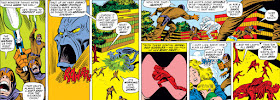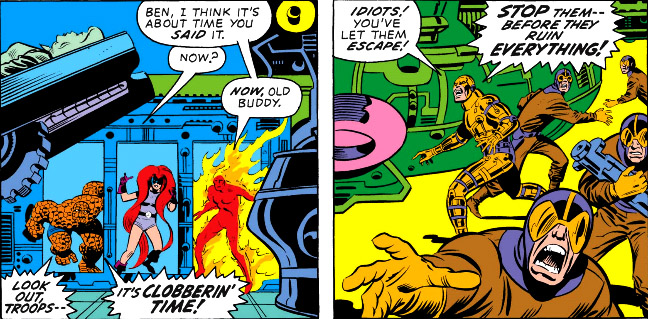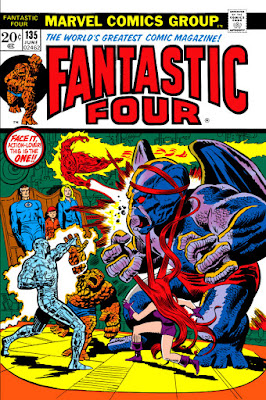After parting amicably following his first encounter with the Fantastic Four, the last thing we would have expected of Gregory Gideon is for him to return over eight years later and go after the team once more, his villainous nature still intact and his vast fortune still being used for nefarious purposes. Only this time, his reason for targeting them has changed. Previously, he sought to defeat them in order to gain a business advantage; but when his plan failed, and he departed New York seemingly a changed man, the plane carrying himself and his family was caught in the radius of a U.N.-authorized atom bomb test* which took the life of his wife. For Gideon and his son, however, the prognosis was equally grim--unless he found some way, any way, to survive.
*It's news to me that the United Nations would sanction atomic bomb testing, but who am I to dispute Gerry Conway.
We've of course jumped ahead in Gideon's story, but the scene we've witnessed has demonstrated one character trait that has stayed with this man (or in this case, resurfaced with a vengeance): his hunger for power, which can't help but raise the question whether it, rather than the welfare of his son, is truly the most important thing in his life. Whatever the answer, it's fair to at least make the judgment that Gideon remains his own worst enemy.
And so we pick things up just as Gideon launches his assault to capture the FF, currently on their way back from investigating a mystery at Whisper Hill. But when their transportation is crippled by Gideon's technology, it's fair to wonder if this man made any provision for their subsequent miles-high plummet to the ground below, which could have ended fatally.
Fortunately, the FF's powers come into play, and they survive intact--but also conscious, which throws a wrench into Gideon's hope to take them captive with relative ease. Yet it comes as no surprise that a man like Gideon would have a contingency plan to turn to; even so, he's obviously not prepared for an impromptu visit from his son, the one person he has always professed is so important to him.
Clearly Gideon has a long way to go before finding himself in the running for Father Of The Year. That said, it's apparent in the story that he's kept from Thomas the knowledge that he shares his father's terminal prognosis, which under normal circumstances would indicate that Gideon has at least a measure of compassion for him. To an extent, that might explain his manic behavior, given that he's working against the clock while trying to hold himself together; but as we continue to see signs of the old Gideon come into play, there's no question that his current circumstances offer no excuse for what he plans for the FF.
In his mention of Sue Richards, Gideon indirectly refers to her current separation from Reed, following a heated conversation which took place after their latest battle with the Frightful Four. But Gideon is nothing if not methodical in the execution of his agenda--and Sue, who is staying with friends in Pennsylvania, is the next to be targeted for capture, with the surprising aid of an android from the FF's past that retains its own motivation for wanting to seize her.
(It may have escaped Sue's notice during Dragon Man's onslaught, but we can add to Franklin's "strange" behavior the fact that this toddler doesn't even flinch at Dragon Man's explosive arrival. That seems intentional on artist John Buscema's part, no?)
What the story reveals is that Dragon Man, located by Gideon's men in a rail yard freight car where he'd been placed after his battle with the Sub-Mariner, is being controlled by a sonic device implanted in his skull as a (you guessed it) contingency in the event of complications in capturing the FF. With the ease in which Sue is taken following her delivery to Gideon's research plant, it's pretty clear that Gideon needn't have bothered with securing the android; in fact, when it comes to Sue, Dragon Man proves to be more of a hindrance than a willing puppet.
In the meantime, Sue's friend, Carol, has contacted Reed with the shocking news that Dragon Man has abducted Sue and Franklin. And when you hope that your wife is going to get in touch with the intention of reconciling, only to hear that she's been taken by a monstrous android, your uncharacteristic silence speaks volumes to your friends and partners.
But while the FF choose to leave Reed to his thoughts, at least for now, the news of Dragon Man in the area has Medusa putting two and two together in regard to Reed's mood--and, following a homing beacon from the Fantasti-Car, she and the Thing arrive at Gideon's plant, to the same reception that Reed appears to have received off-panel.
Well, I'm certainly not going to make any more excuses for Gideon's behavior after a scene like that.
The "Eternity Machine," as it's been billed by Conway, evidently has some deeper meaning for Gideon, but we're left to use our imagination on what it signifies for the device that will drain the FF's power (and lives) and transfer that power to Gideon, since he doesn't elaborate on it further.
Yet Gideon is still missing one vital component of his plan, which arrives courtesy of an attack from the same device that brought down the Fantasti-Car. And this time, it seems, Dragon Man has no problem whatsoever with following his directives, given his past battles with the Human Torch; but it's Gideon himself who nearly derails his project, by saying the wrong thing at the wrong time.
Thanks to Medusa's curiosity on the subject of the Eternity Machine, it's here that Gideon reveals the events that led to the lethal radiation exposure that's afflicted himself and his son. Medusa warns Gideon that he's mistaken if he believes the FF will remain his prisoners, a notion he no doubt dismisses. But once left alone, she proceeds to make good on her implied threat--because containment cells powerful enough to keep even the powers of the Thing and the Torch from penetrating them prove to be completely ineffective against... hair. And tiny bursts of flame. (And heaven knows what else the designer overlooked.)
No, I don't know how a flame burst powerful enough to damage steel machinery fails to melt a mere sliver of the same alloy.
Then again, it's fair to assume from their reaction that neither do Gideon and his men.
Yet Gideon has already begun the process of draining power from Sue, Reed, and Franklin--and if his one-sided battle with the Thing is any indication, he's reached the point where he's become a living extension of the machine's function. And unfortunately, this battle has served to open his son's eyes as to what his father has become.
With the Torch and Medusa being kept busy by Gideon's well-armed forces, the Thing is in dire straits, indeed. But when Medusa somehow finds the opportunity to deftly remove the sonic device that has kept Dragon Man in check, the android's unleashed anger proves to be a handy distraction when he focuses that rage on Gideon, whose true colors by now couldn't be more vividly displayed.
(If we're to believe Conway, the curtain would appear to be drawn on Dragon Man for good this time--though seven years later, Captain America would discover otherwise.)
As for the Richards family, they seem to be recovering from the effects of Gideon's machine--though (far too) much is made of Reed's delayed recovery in the opening scenes of the next issue, most likely as a smokescreen to provide for Sue's discreet exit in this issue's final page.
As for Reed... well, perhaps Gideon's machine has left him in a bit of a fog, if he's willing to chalk up Carol Landers' frantic phone call to him about Sue's capture by Dragon Man as "a mistake."
BONUS!
The covers to this two-part story, rendered by John Buscema, Joe Sinnott, and Mike Esposito.
NEXT:
"What's the big idea telling me my wife was captured!?" The Landers and Reed have it out!
(Kidding!)
 | Fantastic Four #s 134-135 Script: Gerry Conway Pencils: John Buscema Inks: Joe Sinnott Letterer: Artie Simek |
































Big fan of that entire storyline. John Buscema was incredible. He was the best thing of any book he was on.
ReplyDeleteWish he'd have had more superhero time, instead of his stint on Conan. I believe he also did Marvel's Tarzan. I think both were a waste of talent.
Killdumpster, as a life-long Conan fan I strongly disagree that John Buscema's massive contribution to Conan was a "waste of talent". Big John's Conan is legendary!!!
ReplyDeleteBut Comicsfan is not a Conanfan so he probably agrees with you :D
The nub of it is, as far as I've read over the years, Big John did not enjoy (even "hated"?) drawing superheroes. Conan, Tarzan and such genres were far more his cup of tea. One might speculate that his original stint on "Thor" was the best compromise he could hope for...until Conan.
ReplyDeleteBut, I gotta side with the "not a Conan fan" team. An issue or two (at most) a year more than satisfied my appetite for his sword & sorcery adventures.
JB had an excellent run on Avengers, which coincidentally started with a Dragon Man story.
ReplyDeleteWhat was with the cowboys in Pennsylvania?
ReplyDeletelordjim6, if the Landers are still in one piece after Reed gets through reading them the riot act, we'll have to ask them! (Maybe rural Pennsylvania has its share of ranchers?)
ReplyDeleteMurray, I was just thinking the other day how Buscema's work on the Conan book probably resembled a lot of his Thor scenes that featured Asgardians in battle; in fact that may have had a lot to do with my giving CTB a wide berth, since I wouldn't have wanted to see Asgardian fight scenes on a regular basis. "Okay, Conan, you've got a sword, an attitude, and a surly disposition--but that can't be all that sells your book, is it? What else does this book have going for it?"